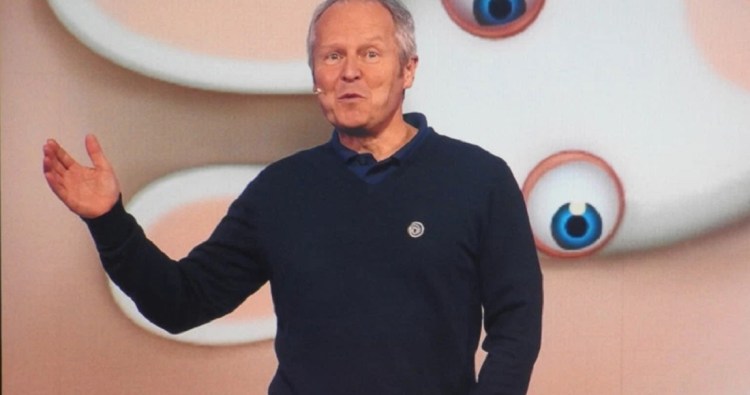Yves Guillemot wants gaming to reach billions more people. That’s why the CEO of Ubisoft, one of the world’s biggest video game companies, welcomes cloud gaming platforms such as the newly announced Google Stadia.
In advance of the Electronic Entertainment Expo (E3), the big game trade show in Los Angeles this week, I spoke with Guillemot about his views of the game industry and the opportunity to make games more accessible to a lot more people. He was bullish on cloud gaming services like Stadia and their ability to bring gamer to wider audiences.
“What we saw [with Stadia] is that streaming is going to [be big],” Guillemot said. ” It will be available for free if you play on a low resolution. [It’s revolutionary, it’s going to give access to everyone and with the ability to play on a tablet]. That will put pressure on the industry, with a new model that can help the industry grow tremendously. Microsoft will almost certainly answer Sony. Sony announced they will come with a machine next year, and Microsoft is certainly going to say something in response.”
“These two events are huge,” he added. “They give us a chance for us to have our triple-A games on mobile devices. Those are the big trends that are going to change the industry.”
June 5th: The AI Audit in NYC
Join us next week in NYC to engage with top executive leaders, delving into strategies for auditing AI models to ensure fairness, optimal performance, and ethical compliance across diverse organizations. Secure your attendance for this exclusive invite-only event.
One of the most attractive things about Stadia is that, once the base version launches next year, you will be able to get started with just a $70 controller and use that to be able to play just about any game. That will reduce the friction, or the obstacles that get in the way of gaming, for many people around the world.

Above: Google has a few colors for its Stadia controllers.
Guillemot also believes that cross play and cross progression (where you can pick up a saved game on any device) are also very important features for cloud gaming. That will enable you to play with all of your friends, regardless of which platform you own.
“That’s pretty cool,” he said.
Asked how the device makers will differentiate themselves in such a world, Guillemot said that the competition will be fierce and the devices makers will have to provide a good experience. Players will have a choice.
As for E3, the big game trade show in Los Angeles this week, Guillemot said the company will have three titles debuting in the fourth quarter. Ubisoft will describe these games at its press event on Monday, and he said we will have to wait and see which leaks are correct and which are not.
One thing that will become clear at the press event is that Ubisoft is adapting its portfolio to reach a larger audience via better accessibility.
“We want to have games that are easy to access and can be played by everyone,” Guillemot said.

Above: Happy Yves Guillemot.
That’s a reference to Stadia again and cloud gaming in general, so that you can access games both the TV and mobile devices.
As for next-generation consoles, the improved processing power will enable “more intelligent game worlds with deeper systems, the ability to play with more friends and have more social interactions,” he said.
The games will take advantage of the immense power of server farms.
Ubisoft has more than 16,000 employees today, which is dramatically higher than a decade ago and compares to 12,000 in 2018. That has been driven in part by the live operations, or the ability to add to games and update the play experiences long after the games are launched. The longer people play the games, the more others will come along and buy the game, helping games monetize over a longer time.
That, in turn, gives Ubisoft more resources to create new brands and new games.
And in contrast to many other big companies, Ubisoft still follows a “tentpole” strategy, where it has big games that support the main part of the “tent,” as well as smaller games that can exist underneath that tent.
Rockstar Games’ Red Dead Redemption 2 took as many as 2,000 people working for up to seven years to bring the game to completion.
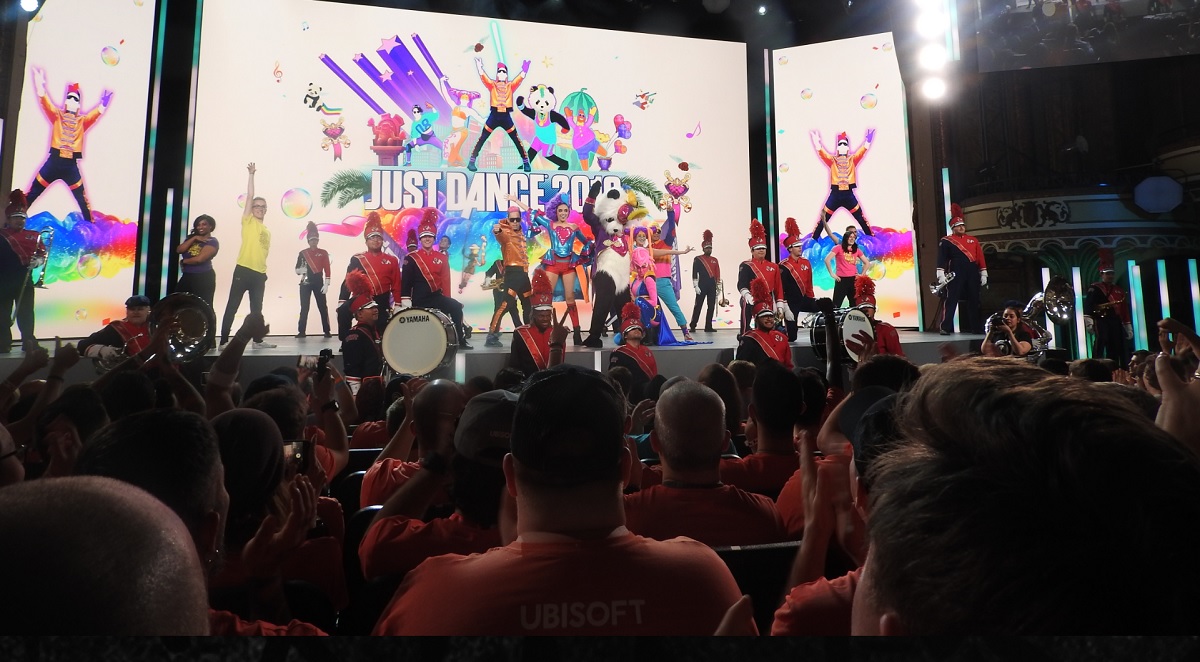
Above: The Just Dance dancers at Ubisoft’s E3 2018 press event.
Guillemot said each publisher is different, but he said, “We certainly want to do better than those guys. So we are working on our systems and our way of doing things to make sure we do better than the competition.”
Sometimes that means bringing a game out every year, and sometimes it means switching, as in the case of Assassin’s Creed, so that developers have more time and the title does not come out every year. with a new game every year, he said.
And since content refreshes happen a lot more often, and players stay immersed in a big title for longer times, there isn’t as much need to come out with a brand new title every year, Guillemot said.
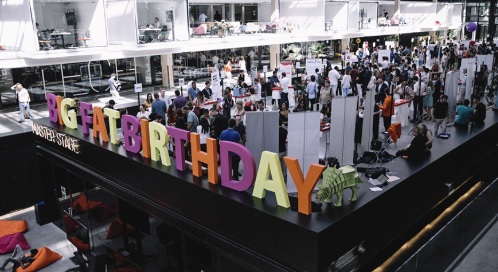
Above: Ubisoft Station F
As for experimental titles like the education-oriented Discovery Tour by Assassin’s Creed, Ubisoft is pleased that teachers are using the non-violent version of the game world to educate children.
“We love that there are more and more teachers using it,” he said. “We want to go deeper and be more interactive.”
Regarding game fans, Guillemot said they are more social and want to communicate and share a lot more than they used to. They want the capacity to create or stream. Guillemot believes that modders and creators will want more tools to create their own content, and Ubisoft will prove it.
Of course, some fans are not behaving so well right now. Asked if he thinks digital civility needs more work, he said yes. Without good behavior, he said, you don’t get the full experience.
“You have all sorts of people, and so it needs constant work,” he said. “There are a lot of tools to understand and detect bad behavior. You can tell people that if you continue it, it will be bad for you.”
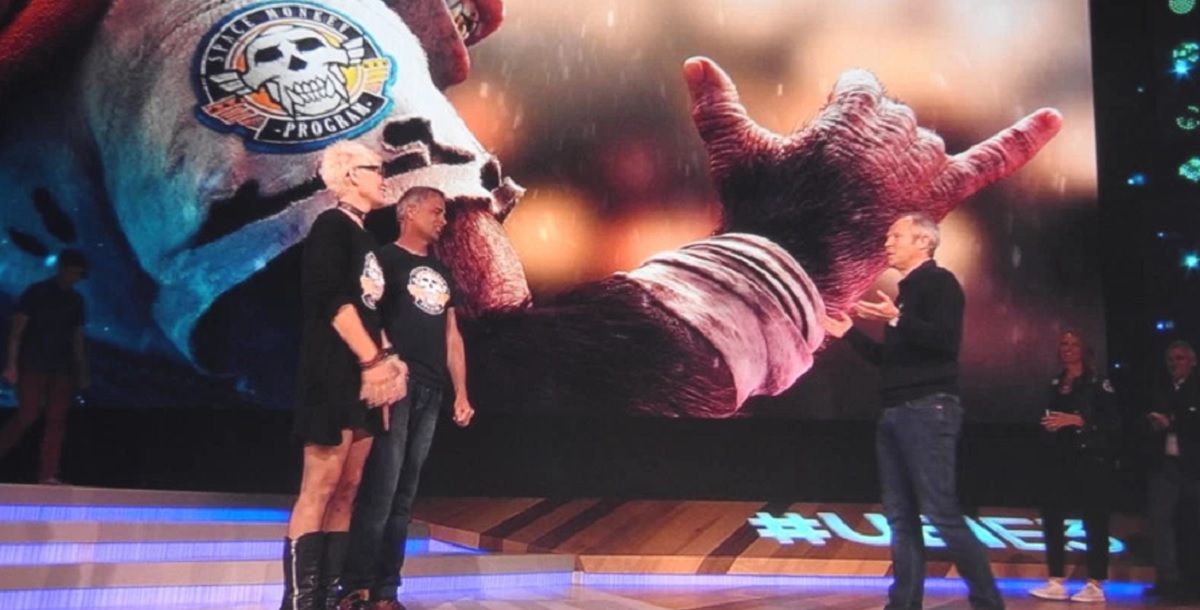
Above: Yves Guillemot (right) at the introduction of Beyond Good & Evil 2 at E3 2017.
Regarding E3, Guillemot said he is very excited for the show. He acknowledged that virtual reality is catching on slower than expected. But he noted a number of the participants have a lot of capacity to invest in VR to make it stronger.
Blockchain, meanwhile, is “unstable,” he said. That means that applying blockchain to gaming is still going to be challenging. The opportunities are huge, but it’s not clear exactly what is going to catch on yet.
As for artificial intelligence, Guillemot said he is excited to see it being used in animations and other tasks to make humans more efficient at their work.
He also said that he embraces technological change and platform changes because it creates the opportunity for disruption.
“In fact, each time you have a disruption, you can be more creative. People are open to new technologies, and so you can try new things,” Guillemot said. “That is very rewarding for the team. And we have to go fast because we have to be the first,” Guillemot said. “That is very rewarding for the team. And we have to go fast because we have to be the first.”
Guillemot said he was pleased with the collaboration with Nintendo on the Switch with Mario + Rabbids, and he said that relationship would continue.
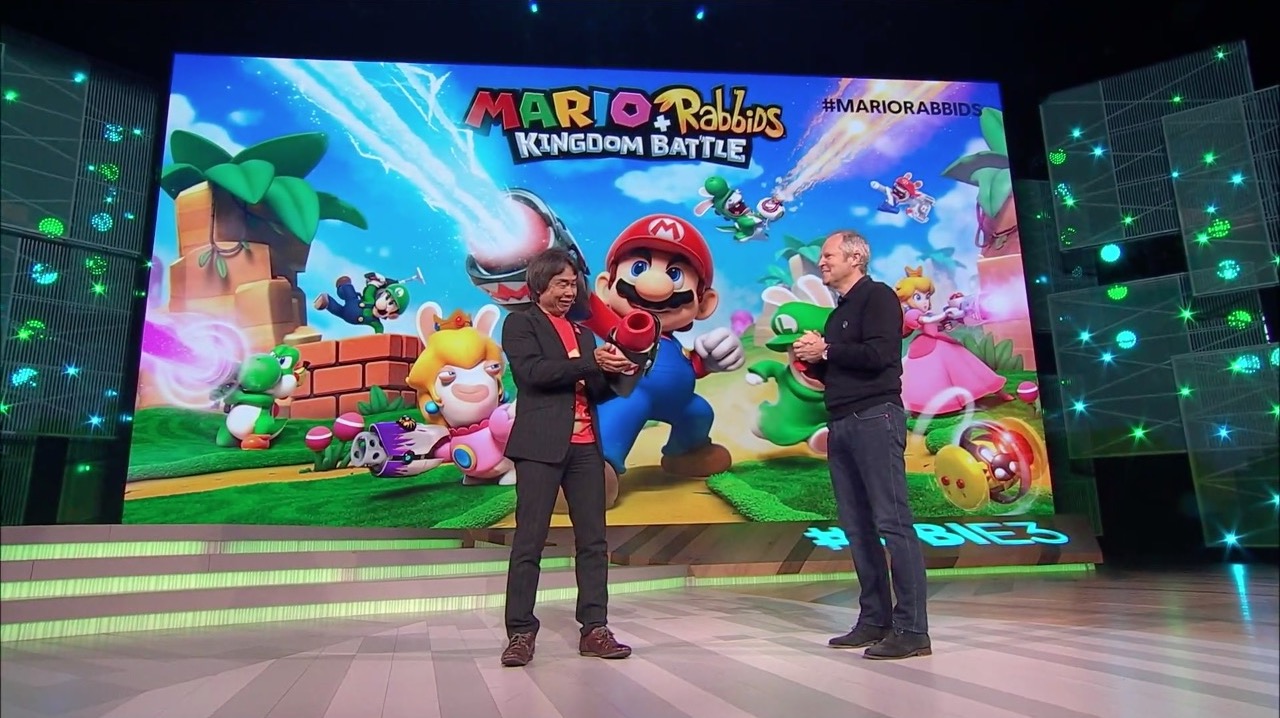
Above: Nintendo’s Shigeru Miyamoto (left) and Ubisoft CEO Yves Guillemot present what was one of gaming’s most unlikely marriages at E3 in 2017.
Ubisoft survived a hostile takeover attempt by Vivendi. Tencent agreed to buy Vivendi’s stake and Vivendi went away.
Asked why it’s important for Ubisoft to be independently owned, Guillemot said, “Everything we just said is actually, as we have seen. The industry is changing so often that you have to take risks. And when you’re part of a big corporation, you spend your time explaining to all the people that it should be good to go there.
